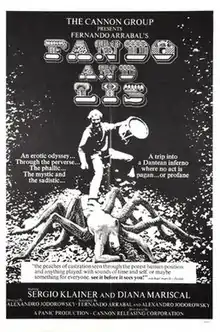Fando y Lis
Fando y Lis is a 1968 Mexican film directed by Alejandro Jodorowsky in his feature length directorial debut. It is an adaptation of a play of the same name by Fernando Arrabal, who was working with Jodorowsky on performance art at the time. The film was shot in high-contrast black-and-white on the weekends with a small budget and was first shown at the Acapulco Film Festival in 1968.
| Fando y Lis | |
|---|---|
 | |
| Directed by | Alejandro Jodorowsky |
| Produced by |
|
| Written by |
|
| Based on | A play by Fernando Arrabal[1] |
| Starring |
|
| Music by |
|
| Cinematography |
|
| Edited by | Fernando Suarez[1] |
Production company | Producciones Pánicas[2] |
Release date |
|
| Country | Mexico[2] |
Plot
The film follows Fando (Sergio Klainer) and his paraplegic girlfriend Lis (Diana Mariscal) through a barren, postapocalyptic wasteland in search of the mythical city of Tar, a place where one will know the true nature of eternity, and reach enlightenment. On their journey they see many odd and profoundly disturbing characters and events.
The narrative of the film leaves a lot to the audience's interpretation, as the avant-garde and surreal nature in which the events of the film are presented mimic the workings of the subconscious.
Release
Fando y Lis premiered at the 1968 Acapulco film festival.[3]When the film premièred at the festival, a full-scale riot broke out.[4] The film was later banned in Mexico.[5] The film was shown in New York 's 5th Avenue Cinema where it was dubbed, re-edited and cut by 13 minutes.[3] The film was shown in London, England in February 1971 and was re-titled Tar Babies, running 98 minutes.[3] It was not released in Mexico until July 1972.[3]
The film has received a 4K digital restoration and is set to be re-released in UK cinemas by Abkco Films for a limited time commencing on February 7, 2020.
Reception
On the films release in New York to generally negative reviews, with many critics comparing it unfavorably to Fellini Satyricon, which had recently opened.[5][3]
References
- Curti, Roberto (2020). "Credits". Alejandro Jodorowsky (Booklet). Arrow Video. p. 7. FCD1932.
- "Information". British Film Institute. Retrieved September 3, 2020.
- Blackford, James; Curti, Roberto (2020). "Credits". Original Reviews (Booklet). Arrow Video. p. 67. FCD1932.
- Rosenbaum, 1992. p.92
- Rosenbaum, 1992. p.93
- Bibliography
- Rosenbaum, Jonathan (1991). Midnight movies. Da Capo Press. ISBN 0-306-80433-6.